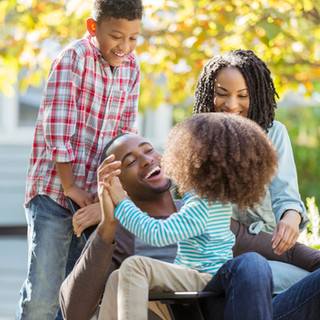Mindful Kids
- abozja
- Jun 25, 2021
- 3 min read
If you're asking yourself if your child is too young to practice mindfulness, the answer is, "NO."
There are certain milestone scholars have defined that individuals are expected to reach at certain parts in his/her life. However, theorists did not specifically outline when kids are "ready" to meditate, to stop and listen to their bodies, or to learn to be one with their breath.
It is natural to wonder whether your child is capable of sitting still for one whole minute and connecting to his/her breath. I would be lying if I said I did not question whether that was a possibility from time to time, but at the end of the day, kids are able to learn to be instead of do. To act instead of react.
Children of any age can benefit from the techniques of meditation and breathing. For example:
- A 3-year-old toddler can follow an adult’s rate of breathing and begin to connect to the calming sensations created by this/her own parasympathetic nervous system response
- A 5 year old can engage in a sound meditation by focusing on the bell a sound bowl makes, strengthening his/her level of self awareness and how the vibrations of sound travel through the body.
Practicing mindfulness affects behavior:
As an adolescent mindfulness integrated cognitive behavioral psychotherapist, I witness the tangible effects of implementing mindfulness techniques on a daily basis. Children sometimes have a difficult time seeing beyond their immediate experience, leading them to react to situations instead of pause and respond. If a child learns how to become more aware of his/her internal state by observing his/her thoughts and bodily sensations without judgment, the child will be more likely to regulate his/her emotions more effectively and thereby make more positive mood independent choices. When a child practices mindfulness, he/she learns to listen and respond in ways that are more compassionate and considerate of others and themselves.
Practicing mindfulness affects relationships:
By learning how to be present with themselves and the people they interact with in the current moment, children are able to communicate more clearly and experience empathy and compassion for themselves and others. This means that kids will be more aware of their interactions with others and more willing to receive feedback from their peers and adults.
Practicing mindfulness affects classroom performance:
During my time in the classroom, I noticed a high level of testing anxiety and behavior problems in students that were not able to understand or tolerate their bodily sensations created by anxiety. In an effort to help students settle their minds and connect to their bodies, I decided to implement the powerful principles of meditation and breath control that foster mind-body integration and awareness that I had been practicing for many years through yoga. Students learned how to observe their internal response to stress to increase their frustration tolerance and decrease their overall anxiety and restlessness. I observed that students who learned how to channel their attention to their breath during testing appeared more relaxed and focused on the material. Students also reported that they were able to recall content needed to be successful on the test more easily.
It starts with YOU! :
Kids learn by observing others. That means that parents and caregivers play an integral role in their children's mindfulness practice. If your child is in the car with you during rush hour and someone cuts you off, you better believe that your child is consuming how you respond to the situation. For example, if you yell "WTF" and ignore how that experience angered you, your child will lose an opportunity for learning how to process their anger. For example it will be more adaptive for you to say to your child, "honey, that person just did something dangerous and it scared me so I said a "bad" word. I felt my shoulders get tense and my belly get warm! Now, I'm returning to my breath and noticing how the air travels down to my belly and cools it. Did you notice anything in your body when he cut us off? Let's breathe together for a few minutes!" By doing this you are practicing verbalizing your internal expereince and how you mindfully responded in a caring way.













